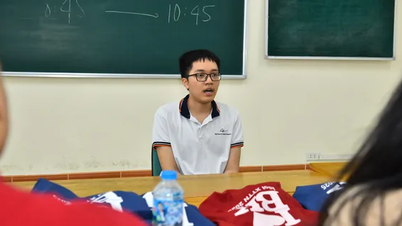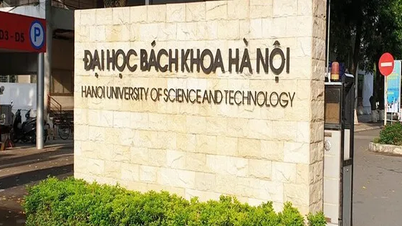IELTS conversion worries
Nguyen Thao Nhi (Trang Bom, Dong Nai ) has just completed the 2025 High School Graduation Exam with an expected English score of 6.5. This is the score Nhi self-assessed after comparing it with suggested solutions from newspapers and reputable exam preparation centers. Nhi intends to apply to the International Business or Finance - Banking major with the High School Graduation Exam score consideration method at Saigon University and some other universities in Ho Chi Minh City. However, she cannot help but wonder when she learns about the school's IELTS score conversion policy.
According to the regulations of Saigon University, candidates can use English certificates for admission in the combination of English scores. If they achieve 4.0 - 5.0 IELTS or 450 - 499 TOEFL, candidates will be converted into 8 points for the English graduation exam. Level 5.5 - 6.5 IELTS or 500 - 626 TOEFL will be converted into 9 points and from 7.0 IELTS or 627 TOEFL or higher will be 10 points.
“This means that if you have an IELTS certificate, you will have a big advantage in admission, even achieving high scores in English without having to worry too much about the results of the High School Graduation Exam,” Nhi said.
The concerns of the Dong Nai female student are also common concerns of many candidates in rural areas - where learning conditions and access to high-quality English test preparation centers are limited. Currently, universities are increasingly expanding their admission criteria using international English certificates, the most popular of which is IELTS.
According to preliminary statistics, there are currently more than 70 universities nationally applying the conversion of international language certificate scores to a 10-point scale to replace English scores in the High School Graduation Exam or in combination with academic records and other criteria. The conversion rate varies, depending on each school and certificate.
Ho Chi Minh City University of Industry stipulates that IELTS 4.5 is equivalent to 7.5 points on the high school graduation exam and 8.0 points on the high school transcript, while IELTS 6.5 or higher is rounded up to 10 points. Ho Chi Minh City Open University and Ho Chi Minh City University of Agriculture and Forestry also apply the 10-point level for IELTS from 6.5. Ho Chi Minh City University of Industry and Trade converts IELTS 5.5 - 6.0 into 8 points, 6.5 - 7.5 into 9 points and 8.5 - 9.0 into 10 points. Ho Chi Minh City University of Technical Education converts IELTS 4.5 into 7.5 points; 6.5 into 9.5 points and 7.0 or higher into 10 points.
In addition, some schools apply their own scoring scale or bonus point policy for candidates with international language certificates. For example, Ho Chi Minh City Banking University converted IELTS from 4.5 to 18 - 26 points on a 150-point scale for the admission method of combining academic results and high school achievements.
University of Economics and Law (Ho Chi Minh City National University) allows candidates to use the converted results of international English certificate scores instead of the corresponding English exam scores to consider the total score of 3 graduation exam subjects according to the admission subject combination.

Opportunity or inequality?
The IELTS score conversion policy in university admissions brings great advantages to candidates who possess international language certificates. However, this also raises questions about fairness and opportunities for all candidates.
"Not all candidates have the financial means and opportunities to access IELTS or TOEFL courses and exams. The cost of IELTS courses and exam fees is not small. Moreover, studying and taking the IELTS exam requires a long process and serious investment, not everyone has the conditions to pursue it," said a high school teacher in Ho Chi Minh City.
MSc. Pham Thai Son - Director of the Admissions and Communications Center, Ho Chi Minh City University of Industry and Trade, commented that universities prioritizing admission based on English certificates such as IELTS and TOEFL is an inevitable trend in the context of deep international integration.
“This is not only a way for schools to objectively evaluate candidates' foreign language proficiency, but also reflects Vietnamese students' ability to integrate intoeducation and potential to work in an international environment,” Mr. Son analyzed.
Looking at it from a positive perspective, MSc. Son emphasizes that international English certificates are not only an admission factor but also an essential tool to support students in their future studies and work.
“According to current regulations of the Ministry of Education and Training, the English output standard for university students is level B1. Therefore, even without IELTS, students still need to constantly strive to improve their foreign language skills to meet graduation requirements and effectively integrate into the global labor market,” said Mr. Son.
MSc. Cu Xuan Tien - Head of Admissions and Student Affairs Department, University of Economics and Law (Vietnam National University, Ho Chi Minh City), gave a multi-dimensional perspective on prioritizing IELTS certificates in university admissions, saying that this is not entirely unfair to candidates from disadvantaged areas. Obtaining international English certificates requires a large investment of time, effort and finance from candidates themselves and their families. Therefore, it is completely appropriate for universities to prioritize or encourage these candidates in admissions.
In addition, Master Cu Xuan Tien pointed out that in the same major and training program, universities often have many common subject combinations for admission. The admission scores between these combinations are often not significantly different. Therefore, schools still create opportunities for candidates who do not possess an international English certificate to use other subject combinations for admission.
In the long run, the use of international English certificates in admissions also encourages students to improve their foreign language skills at the high school level. This brings long-term benefits to them, not only in admissions but also in better opportunities to study at university and find jobs.
Many experts have expressed concern about the lack of consistency in converting IELTS scores and other international language certificates among universities. For example, with the same IELTS score of 6.5, some universities convert it to 10 points, while others only calculate it as 8-9 points. At the same time, experts say that when the score distribution of high school graduation exams in 2025 is announced, universities need to adjust the above conversion rate to be reasonable and scientific.
Source: https://Giaoducthoidai.vn/quy-doi-diem-ielts-de-xet-tuyen-co-hoi-hay-rao-can-post738344.html








































































































Comment (0)